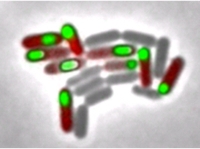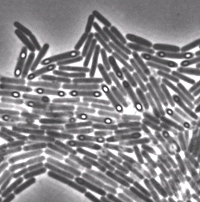 |
forespore (green) and mother-cell (red) Image: Avigdor Eldar, Caltech |
 |
spores within the darker cells Image: Avigdor Eldar, Caltech |
**__Related stories:__***linkurl:Making pretty pictures;http://www.the-scientist.com/article/display/53246/
[June 2007]*linkurl:Twins diverge;http://www.the-scientist.com/article/display/53128/
[May 2007]*linkurl:Unlikely heroes;http://www.the-scientist.com/article/display/13855/
[2nd June 2003]




















